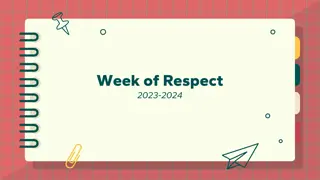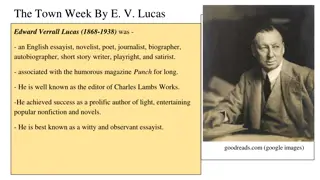
Gender and Identity Debate in Early Modern Europe
Explore Gabrielle Suchon's advocacy for voluntary celibacy as a neutral lifestyle choice for women in early modern Europe, challenging the traditional options of marriage or monastic living. Suchon's writings emphasize the virtues of celibacy, the limitations of marriage and monasticism, and the empowerment of women through intellectual independence.
Download Presentation

Please find below an Image/Link to download the presentation.
The content on the website is provided AS IS for your information and personal use only. It may not be sold, licensed, or shared on other websites without obtaining consent from the author. If you encounter any issues during the download, it is possible that the publisher has removed the file from their server.
You are allowed to download the files provided on this website for personal or commercial use, subject to the condition that they are used lawfully. All files are the property of their respective owners.
The content on the website is provided AS IS for your information and personal use only. It may not be sold, licensed, or shared on other websites without obtaining consent from the author.
E N D
Presentation Transcript
History 336 Ideas and Society in Early Modern Europe: The Debate about Gender and Identity 1 MARCH 13, 2013 TUTORIAL PAGES 229 TO 285 BY KING YAN WONG & JANE FRENCH Gabrielle Suchon: A Woman Who Defends All The Persons of Her Sex Selected Philosophical and Moral Writings Edited and Translated by Domna C. Stanton and Rebecca M. Wilkin
Suchon: Voluntary Celibacy, Life without Commitments 2 Women only have only 2 choices in life, marriage or monastic living, but Suchon argues for Neutralism , a 3rd way for women to live. Neutralism offers an independent and intellectual life free of commitments and distractions through voluntary celibacy & study. (Editor, p229 & Suchon, p238) Suchon: this treatise on voluntary celibacy belong[s] specifically to Neutralists. It is to those generous souls - who devote themselves wholly to serving God, helping their neighbor, and improving themselves ever more that I present this work. (Suchon, p241)
Suchon: Monastic Celibacy & Marriage 3 Both Marriage and the Monastic life are expensive for families (dowry s) and are full of diverting commitments while forcing some to choose a life they are not appropriate for. (p240) Marriage (not a celibate life), keeps women bonded to their husbands, children, and household management, and not the happiness of free persons, exempt from such troubles. (p239) Monastic living is restraining, arduous, and not for everyone. (p238-239)
Suchon: Why Celibacy? 4 3 Pertinent Reasons for celibacy. (p240-241) 1) Celibate persons live in a distinguished sphere, though mixed with society they are separate because of their retreat and their unique way of life. 2) Protection from social dangers, and those who lack the strength to embrace the monastic life and marriage. 3) Help and strengthen the resolve of persons who acknowledge the value of women in the face of destructive misogynistic prejudice.
Suchon: Definition of Celibacy 5 Celibacy is a condition without commitments (p242) and a blessing from divine providence . (p239) Suchon defines her neutralist celibacy in 3 parts (p242): 1) State of indifference for a particular life style 2) Power to embrace the state most appropriate to their way of thinking and their inclination 3) resolution to preserve this state, eschewing every other commitment except for this indifference
Suchon: Study & Neutralism 6 A free minded Neutralist would easily acquire knowledge if they forgo the vices of passion and overindulgence which corrupts the mind and senses. p274 Neutralists should engage in extensive study because it is a way of, first serving God; second, of constantly improving oneself; and third, of being useful to others. p275 Study requires 4 elements; 1) intelligent mind, 2) inclination for retreat, 3) freedom of time, 4) competent and skilled teachers. p278 Suchon admits that prescribing study to aid in the success of a neutralist, celibate life she is really addressing intelligent women who are their own mistresses , and have moderate means , because money is needed for both books and skilled teachers. p279
Suchon: Celibate Reading 7 Reading is the light of the mind, the power of the soul, and the joy of the heart. p267 Books are a special blessing from God , they are spiritual, erudite, instructive, and entertaining. p269 A love of books, together with a mind capable of reasoning and application, ensures our progress in letters and in good morals. p267 A married woman can only read in stolen moments, because she is often distracted and interrupted by her household and familial commitments. p267 A cloistered woman is limited because of the number of exercises she is expected to complete. p267 Free persons (neutralists) have the advantage of retreat from outer world. p267
Suchon: Friendship is Necessary in the State of Celibacy 8 Friendship is very important for the celibate neutralist, it soften(s) the rigor of a solitary estate by sincere and faithful friendship. p285 Essential for those who do not have protection of monastic community or husband. p279 Differs from love, but is not any less pleasing, strong, or genuine. p280 Friendship: sincerity, faithfulness, and steadfastness (p281), and can only exists among a few people. (p280)
Suchon: Discussion Questions 9 1) Is Suchon contradicting herself when on p277 when she renounces eloquence, which attracts admiration, (and) has her enemies , but praises and writes poetry and rhetoric that is supposedly to polish and adorn speech, in order to make what speech proposes more persuasive. (p275)? If the eloquence of an argument helps compel discourse and agreement, what motive could Suchon have in dismissing it? 2) Where does Suchons moderate, neutralist, celibate woman fit in? In a confining social order where does the free person (or free woman) fit into Early Modern European communities? 3) Is Neutralism another way of constructing a new religious order for women, but without the strict and masculine leadership that traditional monastic life has? Is Suchon arguing for a new way of Christian worship that is as far away from mainstream life as monastic life? 4) When does Suchons prescription of the neutralist, celibate woman venture from the traditional private domestic sphere into the masculine public sphere? 5) While considering her whole treatise, does Suchon make an adequate argument to challenge Early Modern European s religious and secular assumptions about women? Who is Suchon targeting her book at, who would support her argument or disagree? 6) How can you eschew commitments, when you make a commitment to be uncommitted? Suchon uses many words in describing what women should do or have in a neutralist life that suggest commitment, other than the commitment to a celibate life. Words such as friendship p280 , faithfulp280 , devotep278 , embracep242 , promisep244 . Does Suchon adequately address this?






















